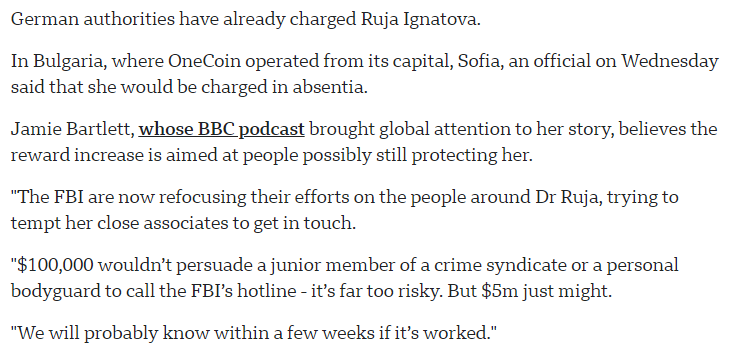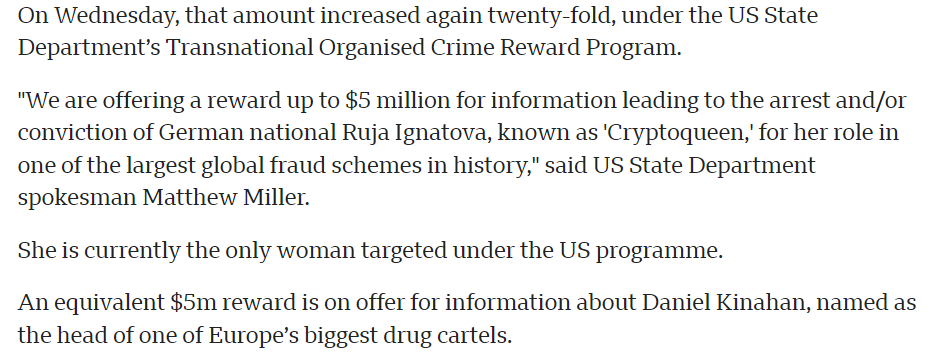The Birth of a Fraudulent Empire: Ruja Ignatova’s Origins
Born in Bulgaria and raised in Germany, Ruja Ignatova cultivated an image of brilliance and sophistication. With a PhD in private international law from the University of Konstanz and a stint at McKinsey & Company, her credentials radiated legitimacy. But even in her early career, cracks began to show. In 2012, Ignatova and her father were convicted in Germany for fraud related to a suspicious company acquisition that ended in bankruptcy. She received a 14-month suspended sentence, a mere slap on the wrist that emboldened her to pursue grander deceptions.
By 2014, Ignatova launched OneCoin, branding it as a revolutionary cryptocurrency poised to dethrone Bitcoin. With promises of astronomical returns and claims of democratizing wealth, Ignatova’s charisma and strategic marketing drew investors from every corner of the globe. Lavish events, including a glittering spectacle at London’s Wembley Arena, cemented her image as a visionary leader. But beneath the surface, OneCoin was a hollow shell, lacking a blockchain—the fundamental backbone of any genuine cryptocurrency. It was not a “Bitcoin killer” but a masterclass in deception.

The Architects of Deceit: A Web of Collaborators
Ignatova didn’t act alone. Our investigation uncovered a network of enablers who amplified her fraudulent scheme. Chief among them was Karl Sebastian Greenwood, OneCoin’s co-founder. A master manipulator, Greenwood spearheaded the global marketing push that lured victims into the OneCoin web. He now serves a 20-year prison sentence in the United States for his role in defrauding investors of billions.
Ignatova’s brother, Konstantin Ignatov, stepped into the spotlight after her 2017 disappearance. His arrest in 2019 at Los Angeles International Airport marked a turning point in the unraveling of OneCoin. Konstantin’s guilty plea to charges of fraud and money laundering exposed damning details about the scheme’s inner workings, including how the coin’s value was arbitrarily set and manipulated to maximize profits for the inner circle.
Mark Scott, a former U.S. attorney turned accomplice, was convicted of laundering $400 million in OneCoin proceeds through a maze of shell companies and offshore accounts. British businessmen Christopher Hamilton and Robert MacDonald also faced allegations of laundering OneCoin funds, although efforts to extradite them to the U.S. have stalled. These collaborators formed the backbone of a well-oiled fraud machine designed to siphon money from millions while cloaking the operation in a veneer of legitimacy.
Organized Crime and Hidden Associations
As we delved deeper, OneCoin’s connections to organized crime came into stark focus. Ignatova’s ties to Hristoforos “Taki” Amanatidis, a Bulgarian drug lord, reveal a sinister layer to her operations. Europol documents suggest that Taki used OneCoin’s financial network to launder proceeds from narcotics trafficking. Reports allege that he even served as Ignatova’s personal security chief, raising suspicions about his role in her sudden disappearance in 2017. Theories abound, with one alleging that Ignatova was murdered aboard a yacht in the Ionian Sea on Taki’s orders, her body dismembered and discarded to erase all traces.
Adding to the intrigue is Frank Schneider, a former Swiss intelligence officer turned OneCoin adviser. Schneider’s claims that Ignatova collaborated with criminal syndicates lend credence to suspicions that OneCoin’s fraudulent profits funded far more than luxury lifestyles. These shadowy relationships blur the line between white-collar fraud and organized crime, painting a damning picture of Ignatova’s empire.
Ignoring Red Flags: The Scam’s Global Reach
By 2016, regulators in multiple countries, including Sweden, Norway, Latvia, Croatia, Italy, and Bulgaria, issued warnings about OneCoin’s fraudulent nature. Yet, investors poured billions into the scheme. Between 2014 and 2016 alone, OneCoin raked in €3.35 billion, with China accounting for a staggering 60% of revenues.
Despite glaring red flags—like the absence of a blockchain and its pyramid-style multi-level marketing structure—investors were mesmerized by Ignatova’s promises of untold wealth. Extravagant events, such as the Wembley Arena extravaganza, masked the scam’s true nature. Attendees were dazzled by pyrotechnics, motivational speeches, and hollow guarantees of financial freedom, leaving millions to chase dreams that would soon turn to nightmares.

Unraveling Allegations: Fraud, Murder, and Beyond
The scope of allegations against Ignatova is staggering. She faces charges of wire fraud, securities fraud, and money laundering. Indicted by U.S. authorities in 2019, she remains a fugitive with a $5 million bounty on her head. German prosecutors have also targeted her associates, investigating a lawyer accused of laundering millions in OneCoin proceeds.
Adding to the grim narrative are reports suggesting Ignatova’s involvement in arms trafficking and human exploitation. Speculative yet chilling, these claims hint at a far-reaching criminal network that leveraged OneCoin’s global reach to fund illicit activities. The mystery surrounding her disappearance—and whispers of her potential murder—only deepen the intrigue. Whether alive or dead, her legacy remains one of greed, betrayal, and destruction.
Legal Fallout: The Dominoes Fall
The legal repercussions of OneCoin’s collapse have been widespread, yet incomplete. Greenwood’s 20-year sentence and Mark Scott’s conviction are notable victories, but Ignatova herself remains elusive. Her addition to the FBI’s Ten Most Wanted Fugitives list in 2022 highlights the international effort to bring her to justice.
Meanwhile, Konstantin Ignatov’s cooperation with authorities has shed light on the inner workings of OneCoin, though the scale of the fraud makes full restitution impossible. A 2024 London High Court order froze global assets tied to Ignatova, including a £13.5 million Kensington penthouse and luxury properties in Dubai. However, recovering stolen funds remains a daunting challenge, leaving millions of victims in financial ruin.
Investor Desperation and Lawsuits
The fallout for victims has been devastating. Over 400 investors launched a group action in London’s High Court in 2024, seeking compensation for their losses. In the U.S., a 2021 class-action lawsuit against Ignatova and financier Gilbert Armenta resulted in a hollow victory when both failed to respond. With $4.5 billion siphoned away, most victims will never see their money again, fueling despair and outrage.
From Ugandan farmers who invested their life savings to retirees in Scotland duped into believing they’d secured a comfortable future, OneCoin’s victims span every demographic. Their stories are a sobering reminder of the human cost of unchecked ambition and greed.
Adverse Media and Reputational Fallout
Ignatova’s public image is irreparably tarnished. Media outlets worldwide, from Forbes to the BBC, have chronicled her rise and fall. The BBC’s podcast The Missing Cryptoqueen delves deep into her story, branding her one of history’s most audacious scammers. Reports of her opulent lifestyle—private jets, designer gowns, and cash-filled offices—contrast starkly with the financial devastation she left in her wake.
Her name has become synonymous with greed and betrayal, casting a long shadow over the cryptocurrency industry. Regulators, once slow to act, are now tightening oversight in a bid to prevent another OneCoin. Yet, the damage to public trust in crypto lingers.
Corruption and Collusion: A Network of Complicity
Ignatova’s success was made possible by a network of enablers, including corrupt officials. In Bulgaria, authorities’ failure to prosecute figures like Taki suggests high-level collusion. Dubai’s lax financial regulations provided a haven for OneCoin’s illicit profits, allowing Ignatova and her associates to launder billions with ease. These failures highlight systemic vulnerabilities that fraudsters exploit, leaving victims unprotected and justice delayed.

Anti-Money Laundering and Reputational Risks
From an anti-money laundering (AML) perspective, OneCoin was a textbook case of failure. Shell companies, offshore accounts, and high-value real estate purchases obscured the movement of illicit funds. The involvement of organized crime only amplified the risks, exposing financial institutions to reputational damage and regulatory scrutiny.
For the crypto industry, Ignatova’s saga is a stark reminder of the need for vigilance. Her name has become a cautionary tale, underscoring the importance of due diligence and robust oversight in an industry vulnerable to exploitation.

Conclusion: A Legacy of Deception
Ruja Ignatova’s OneCoin scam is more than a story of greed; it’s a wake-up call for the world. Her ability to orchestrate a $4 billion fraud underlines the vulnerabilities of global financial systems and the consequences of regulatory inertia. Whether hiding under a new identity, murdered by her own allies, or lying in wait to resurface, Ignatova’s shadow looms large. Her story demands vigilance, accountability, and reform to prevent another empire of lies from rising again.







